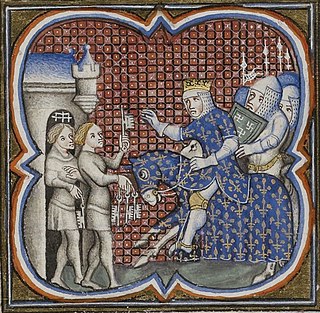
Louis VIII, nicknamed The Lion, was King of France from 1223 to 1226. As a prince, he invaded England on 21 May 1216 and was excommunicated by a papal legate on 29 May 1216. On 2 June 1216, Louis was proclaimed "King of England" by rebellious barons in London, though never crowned. He soon seized half the English kingdom but was eventually defeated by the English. After the Treaty of Lambeth, he was paid 10,000 marks, pledged never to invade England again, and was absolved of his excommunication.
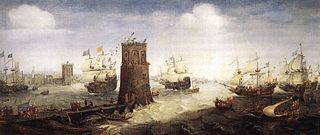
The Fifth Crusade was a campaign in a series of Crusades by Western Europeans to reacquire Jerusalem and the rest of the Holy Land by first conquering Egypt, ruled by the powerful Ayyubid sultanate, led by al-Adil, brother of Saladin.

The First Barons' War (1215–1217) was a civil war in the Kingdom of England in which a group of rebellious major landowners led by Robert Fitzwalter waged war against King John of England. The conflict resulted from King John's disastrous wars against King Philip II of France, which led to the collapse of the Angevin Empire, and John's subsequent refusal to accept and abide by Magna Carta, which John had sealed on 15 June 1215.
Raoul of Mérencourt was the Latin Patriarch of Jerusalem from 1214 to 1224, succeeding the assassinated Albert Avogadro.
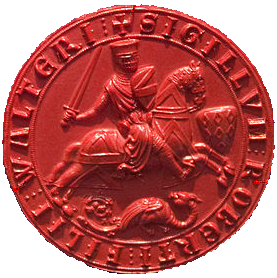
Robert Fitzwalter was one of the leaders of the baronial opposition against King John, and one of the twenty-five sureties of Magna Carta. He was feudal baron of Little Dunmow, Essex and constable of Baynard's Castle, in London, to which was annexed the hereditary office of castellan and chief knight banneret of the City of London. Part of the official aristocracy created by Henry I and Henry II, he served John in the wars in Normandy, in which he was taken prisoner by King Philip II of France and forced to pay a heavy ransom.
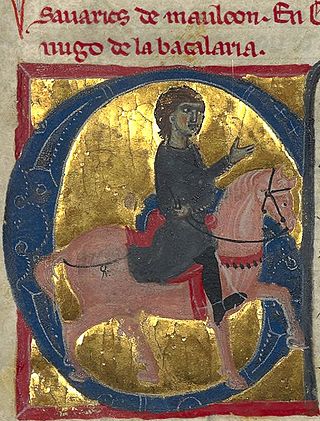
Savari de Mauléon was a French soldier, the son of Raoul de Mauléon, Viscount of Thouars and Lord of Mauléon.

Ranulf de Blondeville, 6th Earl of Chester and 1st Earl of Lincoln, known in some references as the 4th Earl of Chester, was one of the "old school" of Anglo-Norman barons whose loyalty to the Angevin dynasty was consistent but contingent on the receipt of lucrative favours. He has been described as "almost the last relic of the great feudal aristocracy of the Conquest".
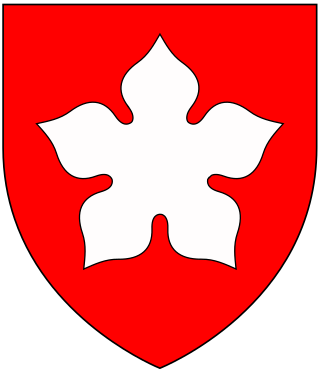
Sir Falkes de Bréauté was an Anglo-Norman soldier who earned high office by loyally serving first King John and later King Henry III in the First Barons' War. He played a key role in the Battle of Lincoln Fair in 1217. He attempted to rival Hubert de Burgh, and as a result fell from power in 1224. His "heraldic device" is now popularly said to have been a griffin, although his coat of arms as depicted by Matthew Paris in his Chronica Majora was Gules, a cinquefoil argent.

The siege of Damietta of 1218–1219 was part of the Fifth Crusade in which the Crusaders attacked the Egyptian port city of Damietta. The city, under the control of the Ayyubid sultan al-Kamil, was besieged in 1218 and taken by the Crusaders in 1219.

The Crusades were a series of religious wars initiated, supported, and sometimes directed by the Christian Latin Church in the medieval period. The best known of these military expeditions are those to the Holy Land in the period between 1095 and 1291 that had the objective of reconquering Jerusalem and its surrounding area from Muslim rule after the region had been conquered by the Rashidun Caliphate centuries earlier. Beginning with the First Crusade, which resulted in the conquest of Jerusalem in 1099, dozens of military campaigns were organised, providing a focal point of European history for centuries. Crusading declined rapidly after the 15th century.

Nicola de la Haie, of Swaton in Lincolnshire, was an English landowner and administrator who inherited from her father not only lands in both England and Normandy but also the post of hereditary constable of Lincoln Castle. On her own, she twice defended the castle against prolonged sieges. After the death of her second husband in 1214, she continued to hold the castle until she retired on grounds of old age in 1226.

Guérin de Montaigu, also known as Garin de Montaigu or Pierre Guérin de Montaigu, was a nobleman from Auvergne, who became the fourteenth Grand Master of the Knights Hospitaller, serving from 1207–1228. He succeeded the Grand Master Geoffroy le Rat after his death in 1206, and was succeeded by Bertrand de Thessy.

Frisian involvement in the Crusades is attested from the very beginning of the First Crusade, but their presence is only felt substantially during the Fifth Crusade. They participated in almost all the major Crusades and the Reconquista. The Frisians are almost always referred to collectively by contemporary chroniclers of the Crusades and few names of individual Frisian crusaders can be found in the historical record. They generally composed a naval force in conjunction with other larger bodies of crusaders.
Events from the 1210s in England.
William of Cassingham was a country squire of Cassingham in Kent at the time of the First Barons' War. During that conflict, he raised a guerrilla force of archers which opposed the otherwise total occupation of the south-east by Prince Louis of France. A contemporary chronicler, Roger of Wendover, wrote of him:
A certain youth, William by name, a fighter and a loyalist [to King John] who despised those who were not, gathered a vast number of archers in the forests and waste places [of the Kent and Sussex Weald], all of them men of the region, and all the time they attacked and disrupted the enemy, and as a result of their intense resistance many thousands of Frenchmen were slain. Roger of Wendover, Flores Historiarum, II. 182.
Morgan ap Hywel was Lord of Gwynllwg in Wales from about 1215 until his death in 1245, and for many years laid claim to the lordship of Caerleon, which had been seized by the Earl of Pembroke. For most of his life he was at peace with the English, at a time when there were periodic revolts by Welsh leaders against their rule. He may have participated in a crusade between 1227 and 1231.
Geoffrey de Neville was an English nobleman who served as King's Chamberlain and Seneschal of Gascony and Périgord.

Renaud de Pons was a nobleman from the Saintonge. He served as Seneschal of Gascony between 1214 and 1217 and briefly as Seneschal of Poitou in 1216. He went on the Fifth Crusade in 1217–21. He and his nephew, Renaud II de Pons, are distinguished in contemporary documents by the epithets senior and iunior. He is also known by the epithet Palmarius because he was a crusader.
The battle of Mansurah took place from 26–28 August 1221 near the Egyptian city of Mansurah and was the final battle in the Fifth Crusade (1217–1221). It pitted the Crusader forces under papal legate Pelagius Galvani and John of Brienne, king of Jerusalem, against the Ayyubid forces of the sultan al-Kamil. The result was a decisive victory for the Egyptians and forced the surrender of the Crusaders and their departure from Egypt.

John FitzHugh was an Anglo-Norman royal counsellor to King John of England.